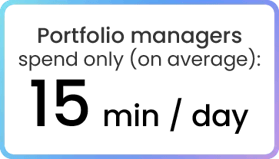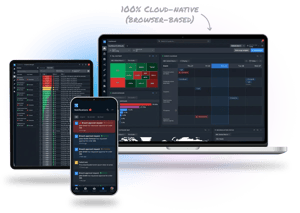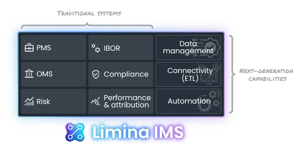
Charles River Development - Competitors & Alternatives
Limina's modern front-to-Mid(NAV) system comes with slick workflows and one of the industry's most flexible IBORs. It's been cloud-native since day one, with frequent releases and managed upgrades - no need for system admin.
Note: All vendor information below is based on online, publicly available information as of 2024-01-05. Sources include company websites, review sites (G2, Gartner, TrustRadius and Capterra) and industry publications.
Why clients opt for Limina

4.9/5 rating by end users.
Slick and effective workflows for Portfolio Managers and Traders.

Managed upgrades that adhere to highest governance requirements of large managers. Become nimble through quick release cycles and self-service features.

98% of investment managers don't have exception-based workflows. 56% have incomplete or unreliable integrations. Not with Limina.

What clients are saying
By adopting Limina's scalable platform, Avanza has launched 33% additional funds without having to scale its investment operations team. They achieved:
- Decreased dependency on single individuals - by replacing spreadsheets
- Improved operational efficiency - by increased automation
Genesis moved to Limina and achieved the benefits of a cloud-native environment (keeping governance & oversight intact):
- Lower IT costs
- Simpler BCP processes
- More efficient operations
What makes Limina different?
Modern user experience
- Full-feature access from browser and tablet
- Native mobile app
- Slick & efficient workflows

Cloud-native (and enterprise)
- Managed & frequent upgrades
(that still adhere to the highest level of governance requirements) - No IT-footprint and no system admin required
- Suitable for enterprise requirements. Your data is isolated (not mixed with other clients) and the microservice architecture allows for scalability

Connect to anything & anyone
Greatly reduce the time spent on manual data input and extracts with Limina's powerful connectivity:
- Standard connectivity to the most popular data & service providers
- Easily build, schedule and maintain your own custom integrations in minutes to anywhere: custodians, internal tools, data warehouses, admins, and more

All workflows centralised & connected externally
All workflows & asset classes in one system - combined in one solution with powerful automation capabilities & built-in data controls.
Easily build, schedule and maintain your own custom integrations in minutes to anywhere: custodians, internal tools, data warehouses, admins, and more.

Partnership approach
We come from the buy-side, have been in your shoes and knows what you want from a vendor beyond a system:
- Dedicated service, by a team that knows your setup and your portfolios
- Ability to influence roadmap and get your requirements prioritised
- Direct access to our product management team, regardless of your company size

Efficient upgrades, integrations & changes save you money

See the next market leader in action
If you're looking to get ahead, and stay ahead, why not schedule a no obligation demo with us at a time to suit you?- 01 CRD
- 02 Limina
- 03 Aladdin
- 04 SimCorp One
- 05 Eze
- 06 Thinkfolio
Best Charles River Competitors
Limina IMS
The team at Limina, as former investment managers, understands the challenges of selecting a system. While we offer powerful investment management software, we believe in providing an unbiased overview. This is why we've listed who we believe are the true top alternatives to CRD here, and not just ourselves (although Limina is often a strong and viable alternative).
We’ve tried to make it easy for you to confirm whether Limina is a match for you or if Limina might not be your best choice.
BlackRock Aladdin
BlackRock Aladdin is a comprehensive investment management platform that provides end-to-end investment management solutions. It offers advanced portfolio risk analytics, performance measurement, trading capabilities, and more.
Aladdin's sophisticated investment software suite caters to the needs of the world’s largest institutional investors, including BlackRock itself. The latter is a common concern, i.e. buying software from who essentially is a competitor.
SimCorp One (rebranded from SimCorp Dimension)
SimCorp One is a front-to-back system used by large investment management companies. The platform supports various asset classes, including both public and private assets. The majority of SimCorp’s client base is in EMEA with a growing presence in North America.
Online reviews highlight data management capabilities. Although highly rated, the system’s complexity and steep learning curve are drawbacks mentioned by users.
SS&C Eze
Eze Software offers various solutions for different parts of the investment lifecycle:
- Eze EMS (formerly known as RealTick) for execution management capabilities
- Eze OMS for order management capabilities, including compliance
- Eze PMS (formerly known as Tradar) for portfolio accounting
Eze has been acquired by SS&C, who also owns Advent which offer similar products.
S&P Markit Thinkfolio
S&P Markit Thinkfolio is a Portfolio Management System, covering modelling and order management.
Thinkfolio seeks to enhance portfolio visibility and improve decision-making processes. The software started in Fixed Income but now covers multiple asset classes.
Thinkfolio was acquired by Markit in 2014, and then Markit was, in turn, acquired by S&P in 2022.









